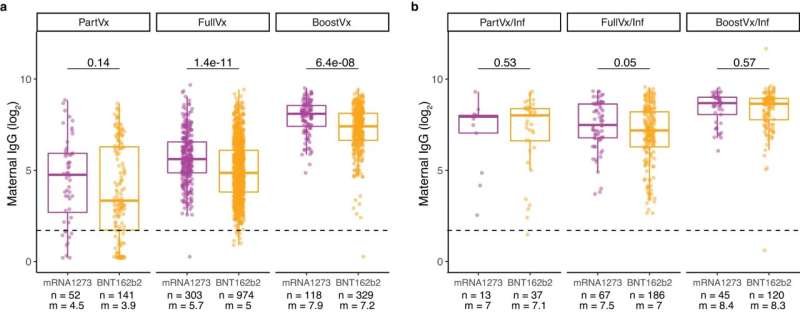This article has been reviewed according to Science X's editorial process and policies. Editors have highlighted the following attributes while ensuring the content's credibility:
fact-checked
peer-reviewed publication
trusted source
proofread
Research shows the value of COVID-19 boosters for those who are pregnant, trying to conceive

Pregnant individuals who had a previous COVID-19 infection and received a full course of COVID-19 vaccination and a booster have the strongest immune protection from the disease—and pass that protection along to their unborn babies, according to a new study from Weill Cornell Medicine and The Rockefeller University investigators.
The researchers, whose study is published in Nature Communications, examined pregnant patients who either had a history of vaccination or infection or both. They found that patients who had a history of vaccination with a booster and a previous infection had the highest neutralizing antibodies against COVID-19 variants including omicron.
The findings suggest that a patient's hybrid immunity, plus booster, provides the strongest protection for both patient and the unborn baby. This is significant because pregnant people can help protect themselves and their unborn child by getting boosted if they haven't already, said study co-senior author Dr. Yawei Jenny Yang, who was an assistant professor of pathology and laboratory medicine at Weill Cornell Medicine and a pathologist at NewYork-Presbyterian/Weill Cornell Medical Center at the time she conducted the research.
"There is hesitancy now that comes from people saying, 'I've already gotten COVID, I don't need to get vaccinated or boosted,'" said Dr. Yang, who is now a clinical assistant professor of pathology in obstetrics and gynecology (courtesy) at Weill Cornell Medicine.
"This study really compared all of the different cohorts—patients who are partially vaccinated, fully vaccinated, boosted—and intersected with cohorts that did or did not have a history of infection. We show that even if you've had a history of infection, by getting boosted you are in the population that has the highest level of antibodies in the mom, and also the highest level of antibodies in the baby."
"As SARS-CoV-2 continues to evolve and acquire resistance to circulation antibodies, it will likely be important for prospective mothers to update their immunity through new vaccine strains to provide maximum possible protection to their infants," said study co-senior author Dr. Theodora Hatziioannou, a research associate professor at The Rockefeller University.
For their analysis, researchers measured the levels and neutralizing activity of spike-binding antibodies in 4,600 patients with different vaccination statuses, with and without history of SARS-CoV-2 infection as well as the antibodies found in umbilical cord blood of their newborns.
The previously infected group had significantly higher levels of the antibody IgG in all vaccination cohorts, however those who had a full series of vaccination and boosters had the highest antibody levels over time. This group had IgG that could be detected for nearly a year (50 weeks) after the last vaccine dose was administered. The results weren't just a quantitative analysis of the antibodies, they were also qualitative, said Dr. Yang, in that this group's antibodies were stronger at combating or neutralizing the virus' infectivity.
"What was exciting is the fact that if you had a history of infection, by getting that booster you now augment and increase your antibody response to a whole other level than just someone who had a history of infection or is fully vaccinated," she said. "And we showed a high correlation between the mom and the baby both for antibody levels and for neutralization activity of the antibodies."
This protection was equal no matter which initial COVID-19 vaccine series the patient had as long as they had a past history of infection as well.
"The Rockefeller-Weill Cornell Medicine collaboration provided an opportunity to generate a very rich dataset, giving a detailed picture of the level of antibody protection in mothers and infants," said co-author Dr. Paul Bieniasz, the Purnell W. Chopping Professor at The Rockefeller University.
The findings suggest that people who are trying to become pregnant or are already pregnant should receive the vaccination course and a booster shot as soon as it's recommended by their doctor, Dr. Yang said. "It will lead to significant changes in your antibody response and your immune response in how many antibodies you create and how strong they are."
"With cases of COVID-19 increasing in New York City, it is even more important to remind birthing people how to protect themselves and their newborns," said Dr. Laura Riley, chair of the Department of Obstetrics and Gynecology at Weill Cornell Medicine and the Given Foundation Professor in Clinical Obstetrics and Gynecology at Weill Cornell Medicine and obstetrician and gynecologist-in-chief at NewYork-Presbyterian/Weill Cornell Medical Center.
"The U.S. Centers for Disease Control and Prevention recommends COVID-19 vaccination and boosters for pregnant or breastfeeding people since they are more likely to get very ill from the disease. This study helps me in the office when patients are reluctant because they already had COVID-19 or think that it's gone. We demonstrate the clear benefit to mothers and their babies when this recommendation is followed."
More information: Elisabeth A. Murphy et al, SARS-CoV-2 vaccination, booster, and infection in pregnant population enhances passive immunity in neonates, Nature Communications (2023). DOI: 10.1038/s41467-023-39989-y




















